In the wake of high-profile, successful strikes by tens of thousands of academics at the University of California (UC) system late last year, higher education workers across the US are now mobilising. The United Auto Workers (UAW), through which University of California employees negotiated with their university system, says it is in talks with graduate student workers at more than a dozen universities in the country, including the University of Southern California (USC) and the University of Maine (UM), which are in the process of organising to secure better working conditions.
Two days before Christmas, academic and postdoctoral researchers across the University of California’s 10 campuses and the Lawrence Berkeley National Laboratory won new five-year contracts that gave them a 20–23% raise, and graduate student researchers there secured a 10% pay increase in the first year of their contract and 6.4% increases in each subsequent year. In addition, the employees negotiated eight weeks of paid leave per year for serious health conditions and also parental leave and other leave to care for family, on top of childcare reimbursement and subsidised transport. These improvements to working conditions ended the unprecedented 40-day strike.
Academic employees across the US took note. The strikes inspired people at research institutions like the University of Washington, where workers have been fighting for their first union contract for about a year-and-a-half.
In June, postdocs, research scientists and engineers ended a strike at the University of Washington after reaching an agreement with their university’s administration that secures significant gains to their pay and working conditions.
Working with UAW, which represents about 100,000 higher education workers across the US, postdocs won salary increases of 28%. Meanwhile, research scientists and engineers at the university received a 33% raise, and also scored future wage hikes that keep up with the cost of living. They also secured a boost to childcare support, on top of improved fee waivers and visa programmes for international scholars.
‘We had a lot of conversations with UC colleagues … about what was effective for them,’ recalls Sarah Pristash, a chemistry postdoc at the University of Washington. ‘A lot of people around the country are talking about this – it’s a bit of a movement,’ adds Pristash, who joined the bargaining committee in December and helped with contract negotiations. ‘We’re all seeing how important it is to unionise and try to make science more sustainable and equitable through collective action.’
Predictions of a ‘larger shift’
It has been really difficult in the last few years, especially in higher cost-of-living areas like Seattle, Pristash explains. ‘People are really struggling to make it work on the stipends that have been the standard for a while.’
She says that Washington’s postdoc pay is now competitive, and predicts that change there and at other institutions will probably lead to a ‘larger shift’ throughout academia.
Academic workers at the University of Southern California, which is not part of the University of California system, have been negotiating a new contract with their university through their union. They voted to affiliate with the UAW in 2020, but so far there have been no strikes.
‘It is a really big wave happening in academia – I think people are realising that we can work together to push back against systemic ways in which our labour is exploited,’ says Megan Cassingham, a fourth-year chemistry PhD student at the University of Southern California, who is on the UAW negotiating team.
She notes that the University of California strikes were ‘just down the road’. ‘A lot of folks here were really inspired by that movement and that action that the students there were taking,’ Cassingham recounts. ‘It made really big headlines.’ More recently, she adds, University of Washington employees were able to win ‘a fantastic contract with their strike efforts, and that is also really inspiring a lot of people across the country’.
Elsewhere in the US, graduate students at the University of Maine started comparing notes about two years ago and concluded that their work was undervalued and underappreciated. On top of their research, they were being asked to take on more courses, as well as teaching and marking. ‘We had and continue to have support from our faculty unions, our state senators, and the local government,’ says Remi Geohegan, a biomedical science and engineering PhD student at the university.
In late February, she was part of a team at Maine that initiated a ‘card campaign’ that graduate student workers used if they were in favour of unionising.
Striking not always an option
‘We’re in discussions with the administration now for voluntary recognition of the union,’ explains Sophie Craig, a biomedical PhD student at the University of Maine. These cards will soon be handed over to a third party that will provide a tally and determine whether a majority have voted to unionise. If not, then a vote on the matter will be triggered across campus in autumn, according to Geohegan.
In the US, the law that protects employees in the private sector is federal, but each state has jurisdiction over public employees. That means that at the University of California campuses and the University of Washington academic workers can go on strike, but at Maine – which is a public institution – they can’t.
‘Striking is really not an option for us here at UM, but there are definitely other forms of collective action that we can take,’ Craig states. For example, in the spring Geohegan and other organisers addressed the university’s board of trustees, and they have also spoken before the faculty senate. In addition, they lobbied the state House of Representatives and Senate, where they obtained letters of support.
Widespread working from home durin the Covid-19 pandemic has helped fuel this movement, according to Geohegan. ‘It has shaped and changed how a lot of us view and value our labour as graduate students – we worked from home for such a long time and saw what life could be like having this improved work–life balance,’ she says.
Chemists and other lab workers, however, face unique health and safety challenges. At the University of Southern California, they recently won a tentative agreement in this area, Cassingham notes. ‘There now is an article in the contract, which the USC administration and the bargaining team have tentatively agreed to before the contract goes to ratification, that essentially gives lab workers the right to refuse work in unsafe or unhealthy conditions,’ she says. ‘This is not something that we had before.’
Cassingham and her colleagues also emphasise that chemistry graduate students and postdocs at the University of Southern California are paid less than their counterparts in comparable departments like physics and earth sciences. ‘As chemists, we see we’re doing very similar work to them and that is upsetting to a lot of my peers – we want to see that wage gap addressed in our contract,’ Cassingham tells Chemistry World.
Arrests made
Action by workers comes with risks. The UAW notes 59 student workers at UC San Diego received emails in June from the university’s office of student conduct accusing them of assault at a protest – this included dozens who were not present at the demonstration. UAW suggests that they were targeted because they support union action.
Earlier this month, one of these postdocs and two graduate workers were arrested and held overnight. They were each charged with conspiracy to commit a crime and vandalism. The vandalism charge was for allegedly using chalk and washable marker at the Scripps Institution of Oceanography to draw attention to the university’s underpayment of workers and refusal to honour contracts, UAW says.
Vandalism is punishable with up to three years in prison and up to $50,000 (£39,000) in fines. Such charges can also affect a person’s ability to graduate and find a job.
On 10 July, graduate workers and UAW officials held a rally at the San Diego courthouse to protest this apparent retaliatory action by the university. They vowed to continue organising protests and other actions until the university drops the charges and implements the contract they are asking for, including adequate wages.





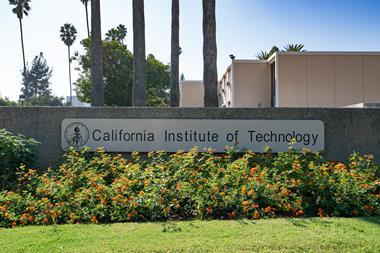
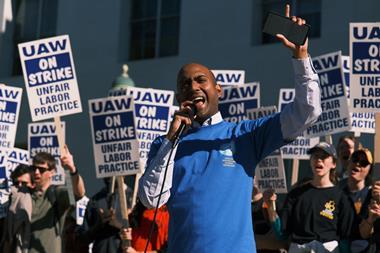
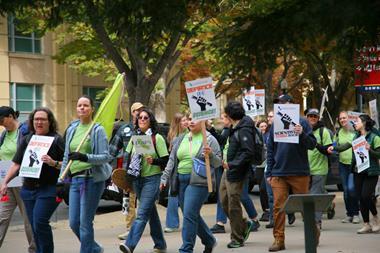
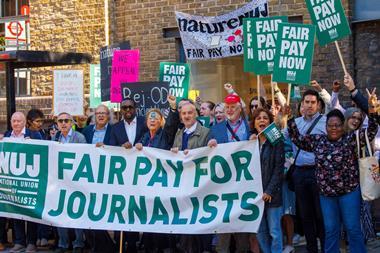

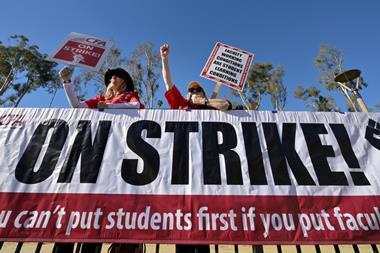






No comments yet